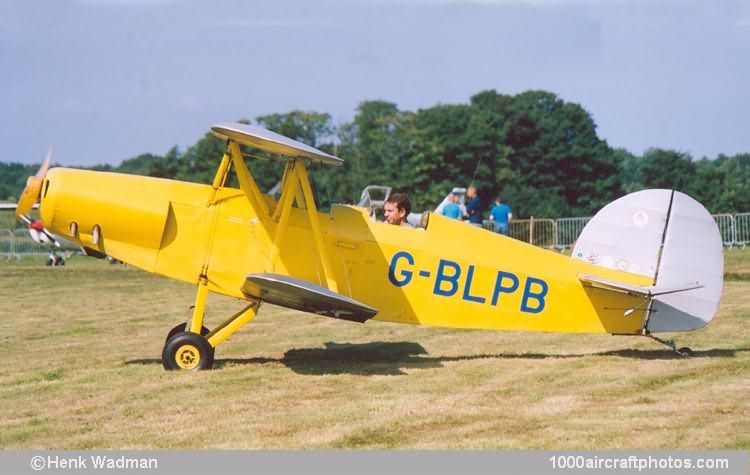By the time of the first flight on October 14, 1979, Turner had moved to York and the designation had officially been altered to Turner TSW, which stood for Turner Special Wot. The aircraft was destroyed in a hangar fire at High Flatts Farm on October 19, 2002, by which time it was designated Turner TSW-2.
Pictured here is the second and last example of the type, produced by James Richard Woolford and Kingsly Maxwell Thomas, both of Helston, UK. The aircraft was registered G-BLPB (c/n TA-001) on October 19, 1984 as a Turner TSW Hot Two Wot.
First flown in 1986, powered by an 150 hp Lycoming O-320, the aircraft is still registered as of this day although reregistered to four subsequent new owners, while the designation has also changed to Turner TSW-2, and the PFA c/n 046-10606 has replaced the original TA-001."
Type: Two-seat lightweight biplane.
Wings: Braced single-bay biplane. Wing section NACA M6. Thickness/chord ratio 12%. Dihedral on upper wings 0°; lower wings 3° 30'. Incidence on upper wings 3° 30'; lower wings 4°. Conventionally staggered wings, with N-type inter plane and center section struts. Streamline section flying and landing wires. Conventional wooden structure of spruce, with plywood leading edge and fabric covering. Plain ailerons, of similar construction, on all four wings. No flaps. No trim tabs. Cut-out in trailing edge of upper wing center section.
Fuselage: Conventional structure of wood with plywood skins.
Tail unit: Cantilever wooden structure of spruce, with all surfaces fabric covered. Fixed incidence tail plane. No trim tabs.
Landing gear: Non-retractable tail skid type. Two side Vs and half-axles hinged to lower fuselage. Shock-absorption by rubber bungee. Goodyear main wheel tires size 6.00-6, pressure 1.38 bar (20 lb/sq.in).
Power plant: One 125 hp Avco Lycoming O-290-3 flat-four engine, driving a two-blade fixed-pitch wooden propeller with spinner. Fuel tank in fuselage, aft of firewall, capacity 16.81 gal (63.6 l). Refueling point on upper surface of fuselage. Oil capacity 2.04 gal (7.6 l).
Accommodation: Pilot and passenger in tandem open cockpits. Removable cover for forward cockpit when flown solo. Baggage locker aft of pilot's cockpit.
